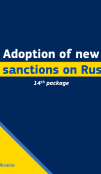Anti-Coercion Bill Passed By European Parliament and Council

The Council and the European Parliament has reached a provisional political agreement on the anti-coercion instrument.
The Swedish presidency, on behalf of the Council of the European Union, agreed on a regulation on the protection of the Union and its member states from economic coercion by third countries (Anti-Coercion Instrument - ACI). This instrument aims to deter third countries from targeting the EU and its member states with economic coercion through measures affecting trade or investment.
Among the measures that could be applied to the third country as a response to economic coercion are the imposition of trade restrictions, for example, in the form of increased customs duties, import or export licences, or restrictions in the field of services or public procurement.
The anti-coercion instrument is designed to de-escalate and induce discontinuation of coercive measures through dialogue. Any countermeasures taken by the EU would be applied only as a last resort.
The European Commission proposed this legislation on 8 December 2021 at the request of the Council and the European Parliament.
The European Parliament’s Committee on International Trade (INTA) adopted amendments to the proposal on 10 October 2022, and the plenary confirmed the Parliament’s negotiating mandate on 19 October 2022 and requested that negotiations begin ‘immediately’.





